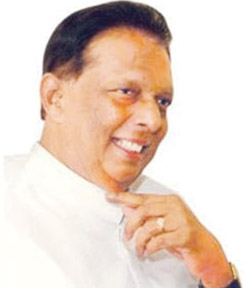John’s defining moments
Continuing the biweekly series, Isuri Kaviratne this
week speaks to Tourism Minister John Amaratunga on politics 40 years ago
:
  Counting
some 50 years in active politics with the ruling United National Party (UNP),
John Anthony Emanual Amaratunga is among the senior most politicians in
the island and still in office. He continues to serve as the Minister of
Tourism, Development and Christian Affairs and recalls a time when
politics was much cleaner and meaningful. He has had the privilege of
seeing powerful politicians being swept into office and being voted out
– and recalls a time when politics was ‘graceful’ and politicians were’
respected.’ Counting
some 50 years in active politics with the ruling United National Party (UNP),
John Anthony Emanual Amaratunga is among the senior most politicians in
the island and still in office. He continues to serve as the Minister of
Tourism, Development and Christian Affairs and recalls a time when
politics was much cleaner and meaningful. He has had the privilege of
seeing powerful politicians being swept into office and being voted out
– and recalls a time when politics was ‘graceful’ and politicians were’
respected.’
Born in 1940, the septuagenarian recalls with happiness when Sri
Lanka gained independence in 1948 – a truly defining moment in the
history of the island. As a child of eight, he watched with great
interest, the special parade that marked the occasion and the happiness
etched on peoples’ faces.
Gaining independence
John Amaratunga never dreamt of becoming a politician. He harboured
no great ambitions in his carefree childhood. Having completed his
school education at St. Joseph’s College, Colombo 10, he qualified
himself as a lawyer, entering the highly competitive legal field. He
practiced as a lawyer for a decade before a relative invited him to
enter politics. There was no looking back since then. So, young
Amaratunga happily accepted the invite, and began zealously building up
a constituency for himself, in preparation of the parliamentary
elections in the mid 1970s.
With 37 years of uninterrupted parliamentary life, Amaratunga said
that his chance of a longer parliamentary stint was lost when his entry
was first blocked in 1975 when Ranasinghe Premadasa’s nominee made it,
not him. Disappointed to the core, Amaratunga was soon approached by the
Sri Lanka freedom Party (SLFP) but he promptly declined the offer.
Soon, J.R. Jayewardene, who was the leader of UNP back then, invited
him over to a private dinner and assured him that he will be
accommodated at the first available opportunity and requested that he
remain patient.
In 1978, fulfilling his promise, President Jayewardene appointed
Amaratunga, filling the first vacancy created with the demise of Shelton
Jayasinghe, to Parliament. Since his entry in 1978, Amaratunga has
retained his seat without interruption.
“It was the best time to be in national politics,” he said
nostalgically. It was an important time in the country’s political
history. “We have just seen serious changes in the electoral system with
the introduction of the PR system, together with sweeping economic
reforms. I certainly learnt a lot from him (Jayewardene),” said
Amaratunga.
He said that the strength the UNP exuded back then, primarily stemmed
from the leadership and then, the brilliant frontrunners included in his
team. “We had so much to learn from him, about politics and life itself.
He had both mission and zeal.”
President Jayewardene announced his intention to liberalize the
island’s economy, encouraged foreign direct investment and moved on a
different economic path. People liked it and voted for it, he said.
“I believe he succeeded in his mission. The 5/6 majority in
parliament gave the government the required strength and stability to
pursue those goals. And party politics was a very different ball game
back then. It had values that are lost today. Politics was gentlemanly,
respectable and interesting,” a nostalgic Amaratunga recalled.
 According
to him, his first decade in parliament was a complete learning
experience. As a junior legislator, he observed the manner in which
President Jayewardene allowed space for parliamentarians to work in
their constituencies but each time some complaint reached the party
headquarters, disciplinary inquiries were held. According
to him, his first decade in parliament was a complete learning
experience. As a junior legislator, he observed the manner in which
President Jayewardene allowed space for parliamentarians to work in
their constituencies but each time some complaint reached the party
headquarters, disciplinary inquiries were held.
“He (Jayewardene) used to listen to complaints carefully, never
showing signs of agitation. But he always remembered the complaint and
the inquiry outcome. He never let a complaint go without inquiry,” he
noted.
He also felt that parliamentarians of yesteryear were in a far better
position to offer genuine service to the people. There were job
opportunities for the youth in the country and with the International
Monetary Fund, World Bank and the Asian Development Bank pouring funds
into the newly liberalized island, jobs were being rapidly created.
Countries such as US and Japan came forward to assistant the island in
her journey towards development.
Surge of growth
“This is why there was a surge of unprecedented growth in the late
1970s and the early 1980s.”
Meanwhile, Amaratunga’s job as an MP also took an interesting turn.
He was appointed Chairman of the Committee on Public Enterprises (COPE)
during Jayewardene rule. He spent much time visiting industries and
looking into various issues that COPE was inquiring into.
The social and economic changes that were triggered off by the 1977
change of government were phenomenal, noted Amaratunga.
But, things took a nosedive with the LTTE’s armed struggle calling
for a separate state followed by the JVP insurgency. “If not for these
debilitating uprisings in the North and the South, this country would
have been paradise,” he said, with regret.
Amaratunga admits to the fact that the UNP did not handle the LTTE
issue as well the JVP insurgency well. “The war and the JVP insurrection
undermined the development achievements of the UNP government back
then.”
Violent politics
One of the saddest memories in his life is linked to the bombing of
the parliament. “I was still a junior parliamentarian and was seated in
the back row with MP Gamini Lokuge, when something exploded. I remember
President Jayewardene and Prime Minister Premadasa ducking and going
under the tables in the front row.”
Scared for life, Amaratunga and Lokuge, made futile attempts to crack
the rear glass wall and to exit. But they simply could not break the
thick glass. “It was a disastrous event that changed all our lives in
some form or the other. One UNP parliamentarian died while about another
six got seriously injured.”
When N. Marrikkar was appointed the Minister of Finance in 1988 –
successor to veteran Ronnie de Mel – Amaratunga was made the Deputy
Minister of Finance, the first portfolio he held. He was next appointed
as State Minister of Foreign Affairs and State Minister of Home Affairs.
Amaratunga has later simultaneously held the Cabinet portfolio of both
Foreign Affairs and Home Affairs.
During his days and Deputy Minister of Finance, Amaratunga had to
assume more responsibilities as Marrikkar was constantly unwell and was
not fit enough to run the ministry. Ready to take on any challenge,
Amaratunga ensured that the ministry functioned smoothly, even during
the JVP uprising, when public servants’ salaries could not be paid on
time due to the disruptions and violence. “We managed to get helicopters
and with the support of the Army and the Navy, we handled that crisis as
well.”
Wijeweera episode
Amaratunga happened to be the Acting Minister of Defence in 1989,
when the founder of the JVP, Rohana Wijeweera was arrested. The minister
in charge was Ranjan Wijeratne and in his absence, Amaratunga was fully
in charge. “I was informed of Wijeweera’s capture, but I don’t know what
happened after that,” he added. Subsequent governments couldn’t maintain
the level of development achieved during the time of Jayewardene due to
various issues. There were misgivings about the new electoral system as
well. The journey towards development was getting disrupted.
“The proportional representation system also allows for individuals
to be voted according to the number of preferences garnered. It is a
democratic system but I am not sure whether it is the best electoral
system for our country. It has created massive competition, even among
colleagues. Gradually, the gentlemanly politics of yesteryear got
replaced by a new, highly competitive brand where people began
politically selling themselves.” Amaratunge is no arch critic of the
executive presidency and firmly believes that this office, when put to
good use, can be useful in developing the country. But placed in the
wrong hands, this could spell doom, he noted with concern.
“In recent years, we saw the level of abuse executive presidents can
demonstrate, using the same system. When we came into office, the system
was used to develop the country and to introduce sweeping reforms. Of
late, the example had been quite the opposite.”
End of an era
The political landscape in the island had changed significantly in
the past four decades he had spent as a parliamentarian. While
regretting the serious decline in the quality of politics and
politicians both, Amaratunga however does not regret his entry into the
hurly burly of politics. “Today, people blame political parties for the
current state of affairs. They no longer offer constructive criticism.
That’s the social decline we have to deal with,” he said. Offering a
bouquet to the Rajapaksa administration, he said the former regime had
one strength: development of infrastructure. “I was torn apart for
participating in the ceremony to mark the opening of the Katunayake
Expressway. But being the only person to represent the opposition, I was
there because it s good for the country and there is direct benefit to
my constituency. We have got that divided by now,” he noted.
Young at heart, John Amaratunga still believes that the country would
still be fortunate enough to see true development and a better future.
“I will try to make my contribution, even though it may be small, to
such an endevour.” |

